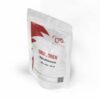Methyl-1-Test 10 mg
$66.00
- Ingredient:Methyl-1-Testosterone
- Manufacturer:Dragon Pharma
- Brand Name:M1T
Methyl-1-Test is an oral steroid derived from Dihydrotestosterone. It is similar in its structure to testosterone-1 and differs only in the addition of the methyl radical in position c-17-alpha. Methyl-1-testosterone can be considered as a kind of union of Primobolan, Stanozolol and Trenbolone. It has a 1-ene from Primobolan structure, Stanozolol’s bioavailability and Trenbolone’s high activity. According to the standard research, Methyl-1-Testosterone is higher than that of any active steroid sold. It is popular among bodybuilders, the drug is famous for rapidly increasing muscle size and strength, with a certain level of water retention and fat growth. In medicine Methyl-1-Test is indicated in treatment of testosterone deficiency in males.
Effective dosage to increase the physical condition 5-10 mg, for 4-6 weeks. Sometimes are used doses up to 20 mg, although these increases the likelihood of side effects. Methyl-1-Test is not recommended for use in women due to the high potential to cause virilization.
Methyl-1-Test is not aromatizing and has no estrogenic activity. Methyl-1-Testosterone has affinity to the progesterone receptor. This progesterone can cause side effects, such as the cessation of the production of testosterone and an increase in body fat. Progestins also increase the stimulating effect of estrogen in the breast tissue for growth. There is a strong interaction that gynecomastia can be caused by some progestins, without an increase in estrogen levels. The use of anti-estrogen can mitigate gynecomastia caused by progestagenic AAS.
Methyl-1-Test is classified as anabolic, but androgenic side effects are still possible. This may be oily skin, acne, hair growth on the body and face. High doses are likely to cause them. Women should be further aware of the potential effects of Methyl-1-Test to cause virilization. This may include deepening of the voice, irregular periods, change in skin texture, facial hair growth, and clitoral enlargement. Its relatively low androgenic, theoretically allows it to be used in women. Methyl-1-testosterone does not react with 5a-reductase and its androgenic can not be changed by parallel use of Finasteride or Dutasteride.
Not recommended in case of hypersensitivity to the Methyl-1-Test, prostate or breast carcinoma, prostate hyperplasia symptoms, nephrosis, edema, hypercalcemia, liver function disorders, diabetes, heart failure or coronary myocardial infarction, atherosclerosis in elderly men, pregnancy and lactation. Adolescents should use it caution to avoid premature cessation of growth and puberty. In case of acute overdose toxicity is low. In case of chronic overdose is possible to develop priapism.
Many users believe that the combination of 10 mg per day with 200-400 mg of Testosterone Cypionate a week, gives better results. It may also reduce the toxicity to the liver, compared with increasing the dose of Methyl-1-Test. Athletes often complain that during the cycle of a methyl-1-testosterone they feel sleepy. This problem can be solved by adding flavoring androgen. As Oxymetholone, Methyl-1-Test is not a friendly steroid, but certainly very effective.
Only logged in customers who have purchased this product may leave a review.












Reviews
There are no reviews yet.